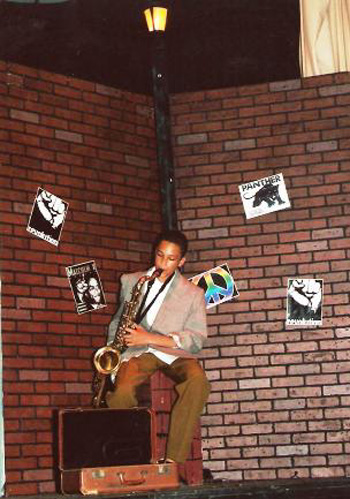‘Street Corner Blues’ Receives Rave Reviews
by Don C. Locke
 |
| W. LaVonne Griffin, Director of the W.C. Reid Center of Performing Arts, and producer of “Street Corner Blues.” |
The stage of the W. C. Reid Center was the scene of the debut of Anthony Alexander’s play, Street Corner Blues — a retrospective look at events of April 4, 1968. The action is narrated by Bob Smith, as he examined the day Dr. Martin Luther King, Jr. was assassinated in Memphis, Tennessee.
The narrator takes the audience through the events from his perspective as a young adolescent living in a family directly touched by the events of the day. This young man, William Johnston, played by Pierre Griffin, is caught up in the many struggles of a family coping with life in a segregated city plagued with how to negotiate the many relationships he faced.
Williams father, James, played by Marcus Grey, is a part of the
citywide strike that brought Dr. King to Memphis. His primary struggle
over “being a man” is amplified by his wife, Nellie, played by
Shantaine Goodlet, who works as a housekeeper for Mrs. Anna Stratton,
played by Carolyn Stanberry. Nellie is caught up in the situation of
being a silent housekeeper while her employer offers deprecatory,
belittling, and negative remarks about Dr. King.
The Johnston family situation is further exacerbated when Nellie
quits her job, in a very moving scene that actually captures the
essence of the volatile race relations situation in the town. What this
means for the Johnston family is that the young William became the only
working member of the family.
Other events in the play portray William’s younger sister
Denise, played by Kasia Maatafale, struggling with her emotions of
being among the first to attend the recently desegregated school. She
is torn between her African American best friend and her newly formed
friendship with a white classmate. The action in the scenes with these
three provides the audience with a clear picture of the struggle
youngsters face as they chart new and unexplored territory.
 |
| Logan Murray plays the sax capturing “the Blues” in “Street Corner Blues.” |
Perhaps the most powerful of all struggles in the play is the
one between William and his friend Tyrone, played by Tobar Koone.
Tyrone, a sometime follower of the teachings of Malcolm X, represents
the essence of the real struggle in civil rights between those who
advocate non-violence and those who advocate advancement at any cost.
One scene, in which Tyrone pulls a gun on store owner Mr.
Robertson, played by Doug Grant, is particularly moving. This is the
same store where young William is employed. Mr. Robertson expresses his
frustration with being accused of wrongdoing “simply because he is
white.”
The highlight of the play for this writer was the somber
mournful saxophone music of Logan Murray that connected the scenes. In
fact, it was the placement on the set of pictures of Jesus, Martin
Luther King, Malcolm X, and John F. Kennedy on one side, all
representing hope for the best, and the saxophonist on the other side
of the set, that framed the entire play. One could not escape the
seriousness of the play in the presence of the music.
The surprise ending of the play, set in contemporary 2008,
brought the audience to its feet. Director W. LaVonne Griffin produced
an outstanding interpretation of Street Corner Blues.
Street Corner Blues will début at the Asheville Community
Theater on February 13, 2009, under the direction of W. LaVonne
Griffin, Director of W.C. Reid Center for Creative Arts. There are
tentative dates for other venues around the Asheville community and
beyond. Please check www.theurbannews.com for updates and details.






